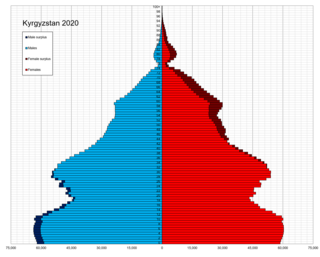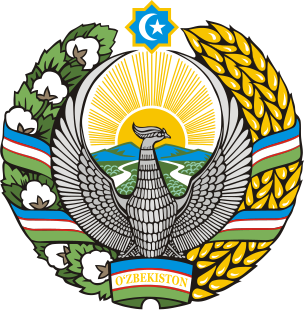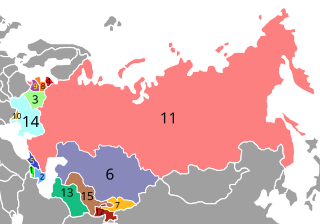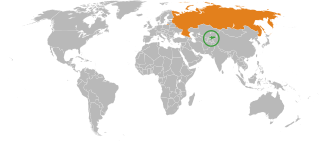| |||||
| Decades: | |||||
|---|---|---|---|---|---|
| See also: | |||||
The following lists events that will happen in 2015 in Kyrgyzstan .
| |||||
| Decades: | |||||
|---|---|---|---|---|---|
| See also: | |||||
The following lists events that will happen in 2015 in Kyrgyzstan .

Central Asia is a subregion of Asia that stretches from the Caspian Sea in the west to China and Mongolia in the east, and from Afghanistan and Iran in the south to Russia in the north. The region consists of the former Soviet republics of Kazakhstan, Kyrgyzstan, Tajikistan, Turkmenistan, and Uzbekistan. It is also colloquially referred to as "The -Stans" as the countries all have names ending with the Persian suffix "-stan", meaning "land of".

The history of the Kyrgyz people and the land now called Kyrgyzstan goes back more than 3,000 years. Although geographically isolated by its mountainous location, it had an important role as part of the historical Silk Road trade route. Turkic nomads, who trace their ancestry to many Turkic states such as the First and Second Turkic Khaganates, have inhabited the country throughout its history. In the 13th century, Kyrgyzstan was conquered by the Mongols; subsequently it regained independence but was invaded by Kalmyks, Manchus and Uzbeks. In 1876 it became part of the Russian Empire, remaining in the USSR as the Kirghiz Soviet Socialist Republic after the Russian Revolution. Following Mikhael Gorbachev's democratic reforms in the USSR, in 1990 pro-independence candidate Askar Akayev was elected president of the SSR. On 31 August 1991, Kyrgyzstan declared independence from Moscow, and a democratic government was subsequently established.

The Demographics of Kyrgyzstan is about the demographic features of the population of Kyrgyzstan, including population growth, population density, ethnicity, education level, health, economic status, religious affiliations, and other aspects of the population. The name Kyrgyz, both for the people and the country, means "forty tribes", a reference to the epic hero Manas who unified forty tribes against the Oirats, as symbolized by the 40-ray sun on the flag of Kyrgyzstan.

The politics of Kyrgyzstan, officially known as the Kyrgyz Republic, takes place in the framework of a presidential system representative democratic republic, whereby the President is head of state and the Chairman of the Cabinet of Ministers is head of government. Executive power is exercised by the government. Legislative power is vested in both the government and parliament. The Economist Intelligence Unit rated Kyrgyzstan a "hybrid regime" in 2019.

The economy of Kyrgyzstan is heavily dependent on the agricultural sector. Cotton, tobacco, wool, and meat are the main agricultural products, although only tobacco and cotton are exported in any quantity. According to Healy Consultants, Kyrgyzstan's economy relies heavily on the strength of industrial exports, with plentiful reserves of gold, mercury and uranium. The economy also relies heavily on remittances from foreign workers. Following independence, Kyrgyzstan was progressive in carrying out market reforms, such as an improved regulatory system and land reform. In 1998, Kyrgyzstan was the first Commonwealth of Independent States (CIS) country to be accepted into the World Trade Organization. Much of the government's stock in enterprises has been sold. Kyrgyzstan's economic performance has been hindered by widespread corruption, low foreign investment and general regional instability. Despite those issues, Kyrgyzstan is ranked 70th on the ease of doing business index.

Kyrgyzstan has close relations with other members of the Commonwealth of Independent States, particularly Kazakhstan and Russia, given the historical legacy of the Soviet Union. It also has close relations with Turkey as well, given their shared heritage as Turkic languages.

Uzbekistan joined the Commonwealth of Independent States in December 1991. However, it is opposed to reintegration and withdrew from the CIS collective security arrangement in 1999. Since that time, Uzbekistan has participated in the CIS peacekeeping force in Tajikistan and in United Nations-organized groups to help resolve the Tajik and Afghan conflicts, both of which it sees as posing threats to its own stability. Uzbekistan is an active supporter of U.S. efforts against worldwide terrorism and joined the coalitions which have dealt with both Afghanistan and Iraq. It is a member of the United Nations, the Euro-Atlantic Partnership Council, Partnership for Peace, and the Organization for Security and Cooperation in Europe (OSCE). It belongs to the Organisation of Islamic Cooperation (OIC) and the Economic Cooperation Organization, which comprises 7 Central Asian countries: Pakistan, Uzbekistan, Kazakhstan, Turkmenistan, Afghanistan, Kyrgyzstan and Tajikistan. It is a founding member of and remains involved in the Central Asian Union, formed with Kazakhstan and Kyrgyzstan, joined in March 1998 by Tajikistan.

The Commonwealth of Independent States (CIS) is a regional intergovernmental organization in Eastern Europe and Asia. It was formed following the dissolution of the Soviet Union in 1991. It covers an area of 20,368,759 km2 (7,864,422 sq mi) and has an estimated population of 239,796,010. The CIS encourages cooperation in economic, political and military affairs and has certain powers relating to the coordination of trade, finance, lawmaking, and security. It has also promoted cooperation on cross-border crime prevention.

Kyrgyzstan, officially the Kyrgyz Republic, is a mountainous landlocked country in Central Asia. Kyrgyzstan is bordered by Kazakhstan to the north, Uzbekistan to the west, Tajikistan to the south, and the People's Republic of China to the east. Its capital and largest city is Bishkek. Ethnic Kyrgyz make up the majority of the country's six million people, followed by significant minorities of Uzbeks and Russians. The Kyrgyz language is closely related to other Turkic languages.
An oblast is a type of administrative division of Belarus, Bulgaria, Kazakhstan, Kyrgyzstan, Russia, and Ukraine, as well as the former Soviet Union and the Kingdom of Yugoslavia.

The politics of Europe deals with the continually evolving politics within the continent of Europe. It is a topic far more detailed than other continents due to a number of factors including the long history of nation states in the region as well as the modern day trend towards increased political unity amongst the European states.

The post-Soviet states, also known as the former Soviet Union (FSU), the former Soviet Republics and in Russia as the near abroad, are the 15 sovereign states that were union republics of the Soviet Union; that emerged and re-emerged from the Soviet Union following its dissolution in 1991.

The Collective Security Treaty Organization is an intergovernmental military alliance in Eurasia. The CSTO consists of select post-Soviet states. The treaty had its origins in the Soviet Armed Forces, which was replaced by the United Armed Forces of the Commonwealth of Independent States, and then by the successor armed forces of the respective independent states.

Kyrgyzstan–Russia relations is the relationship between the two countries, Kyrgyzstan and Russia. Russia has an embassy in Bishkek and a consulate in Osh, and Kyrgyzstan has an embassy in Moscow, a consulate in Ekaterinburg, and a vice-consulate in Novosibirsk.
The Greeks in Kyrgyzstan form one of the country's smaller minority groups. The existing data are contradictory. According to 2009 Census there are 451 Greeks. According to the Greek Ministry of Foreign Affairs, there are 150 families of Greek origin. However, the data of the General Secretariat For Greeks Abroad give an even lower number.

The Eurasian Economic Union is an economic union of some post-Soviet states located in Eurasia. The Treaty on the Eurasian Economic Union was signed on 29 May 2014 by the leaders of Belarus, Kazakhstan, and Russia, and came into force on 1 January 2015. Treaties aiming for Armenia's and Kyrgyzstan's accession to the Eurasian Economic Union were signed on 9 October and 23 December 2014, respectively. Armenia's accession treaty came into force on 2 January 2015. Kyrgyzstan's accession treaty came into effect on 6 August 2015. Kyrgyzstan participated in the EAEU from the day of its establishment as an acceding state.

The Eurasian Customs Union was a customs union consisting of all the member states of the Eurasian Economic Union. The customs union was a principal task of the Eurasian Economic Community, established in 2000, and succeeded by the Eurasian Economic Union. No customs were levied on goods travelling within the customs union and – unlike a free-trade area – members of the customs union imposed a common external tariff on all goods entering the union. The Eurasian Union negotiated as a single entity in international trade deals, such as the World Trade Organisation, instead of individual member states negotiating for themselves.
The Eurasian Economic Union (EEU) currently comprises 5 member states, which are party to the founding treaties of the EEU and thereby subject to the privileges and obligations of membership. The constituent states of the EEU are placed under binding laws and have equal representation within the EEU's executive and judicial bodies. They do however retain considerable autonomy, and must be unanimous for the EEU to adopt policies or new member states. Consensus is a founding principle of the EEU.

Tobias Josef Zech is a German politician of the Christian Social Union in Bavaria (CSU) who served as a member of the Bundestag from 2013 until 2017 and from 2020 until 2021.

The Eurasian Economic Space or Single Economic Space is a single market that provides for the free movement of persons, goods, services and capital within the Eurasian Economic Union. The Single Economic Space was established in 2012 with the goal of creating an integrated single market. It is inspired by the European Internal market and the European Economic Area.
{{cite web}}: CS1 maint: archived copy as title (link)